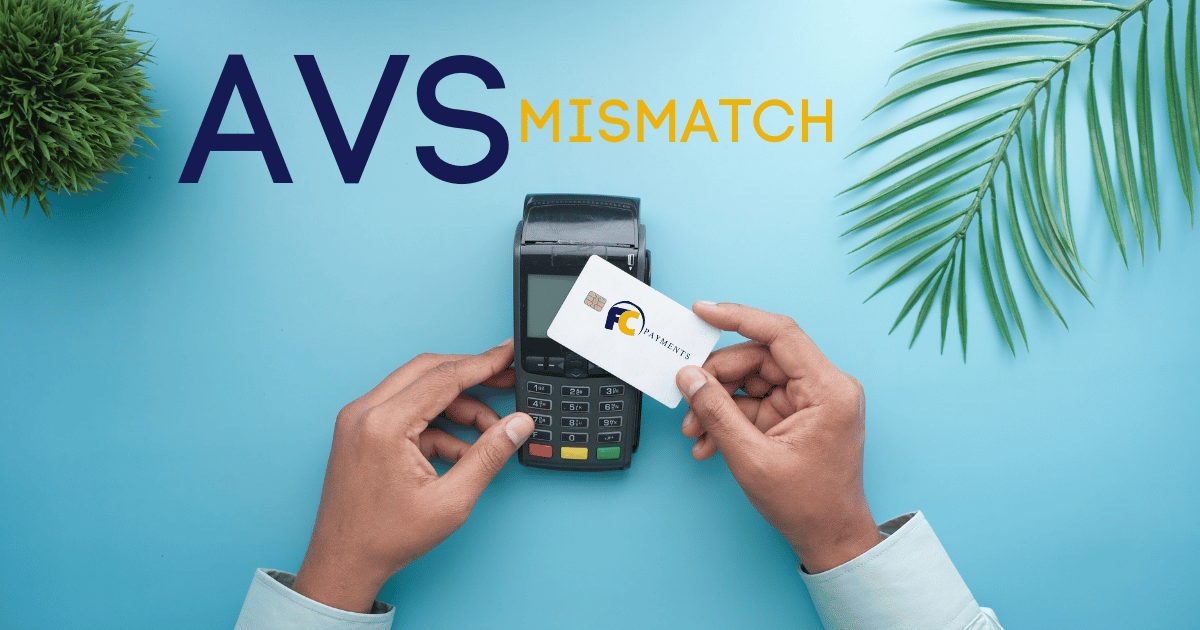
What Is AVS Mismatch? Your Guide to Handling AVS Rejections
What Is AVS Mismatch? Your Guide to Handling AVS Rejections
Are you tired of losing sales due to AVS mismatches? It’s time to learn “what is AVS mismatch” and how to handle these pesky issues to keep your transactions flowing smoothly. Our high risk merchant processors have taken their time to create this comprehensive guide that will shed light on the complexities of AVS mismatch, its impact on your business, and practical strategies to manage them effectively. Buckle up and get ready to dive into the world of AVS mismatch management!
Quick Summary
- Understanding AVS Mismatch involves recognizing and utilizing details to efficiently handle rejections.
- Address Verification is an important tool for protecting businesses from potential financial losses due to fraud and chargebacks in card-not-present transactions.
- Strategies such as enhancing trust with regular customers, verifying customer information, adjusting AVS filters, and choosing the right payment processor are essential for managing AVS mismatches while ensuring a secure payment experience.
Understanding AVS Mismatch
A customer’s billing address is checked against the address their card issuer has on file. If the two don’t match, then an AVS mismatch occurs. This discrepancy can lead to declined transactions, causing frustration for both customers and merchants alike. But fear not – not all AVS mismatches indicate fraud. Sometimes, it could be due to a simple typo or outdated information on the customer’s account.
To handle AVS rejections effectively, it’s essential to understand the supported AVS details, such as the AVS number, and how to use this information to your advantage. This knowledge will enable you to support AVS efficiently and make informed decisions when an AVS mismatch occurs, as well as recognize a successful AVS match.
The Importance of Address Verification
Address verification plays a crucial role in preventing fraud and chargebacks in card-not-present transactions. It helps merchants identify potentially fraudulent transactions by comparing the customer’s billing address, including their street address, with the billing address provided on file with their card issuer. When a mismatch occurs, the transaction may be denied, protecting your business from potential financial losses.
The Address Verification System (AVS) is a valuable tool that complements other security measures, such as card verification value (CVV) checks and avs codes. It is especially important for online transactions, where the customer’s credit or debit card is not physically present, and the risk of fraud is higher. An address verification service can further enhance the security of these transactions.
However, AVS errors can also result in legitimate transactions being declined. To strike the right balance between fighting fraud and maintaining customer satisfaction, merchants must understand the intricacies of the address verification process and fine-tune their approach accordingly.
How AVS Mismatch Errors Occur
The customer’s billing address and the address on file with their card issuer don’t match, which can lead to AVS mismatch errors. Such errors must be resolved in order for a payment to be successful. This discrepancy can lead to declined transactions, negatively impacting customer satisfaction and potentially hurting your business’s reputation.
It’s crucial to remember that not all AVS mismatches signify fraud. Sometimes, an avs mismatch error occurs due to a simple error, such as a typo or outdated address information. In such cases, the merchant can choose to follow up with the customer to authenticate their identity through an alternate method or authorize the transaction if the customer is deemed reliable.
Common AVS Mismatch Codes and Their Meaning
AVS mismatch codes provide merchants with additional information to make informed decisions. These codes vary between card networks and can assist merchants in assessing the risk level associated with a transaction. The three possible outcomes for AVS mismatch codes are match, partial avs match, and mismatch.
For example, the AVS code “Z” signifies a partial match, where the zip code matches but the apartment, street, or suite number provided does not. Understanding these codes is essential for merchants to effectively manage AVS mismatches and decide whether to accept or reject a transaction.
Strategies to Prevent and Resolve AVS Mismatches
To tackle AVS mismatches head-on and ensure smooth transactions, merchants can employ various strategies, such as enhancing trust with regular customers. Verifying customer information and adjusting AVS filters are two other strategies that can be employed.
Enhancing Trust with Regular Customers
Building trust with regular customers can help prevent AVS mismatches and maintain smooth transactions. Offering discounts for repeat customers, providing personalized customer service, and implementing loyalty programs are some strategies to cultivate trust among your clientele.
By establishing rapport with your customers, you can follow up with them to authenticate their identity through an alternate method, such as email verification or two-factor authentication, in case an AVS mismatch occurs. This approach not only helps prevent fraud but also ensures a seamless shopping experience for your loyal customers.
Verifying Customer Information
Verifying customer information is a vital step in avoiding AVS mismatches. By confirming the accuracy and legitimacy of customer information, merchants can reduce the probability of fraud and ensure legitimate transactions are not declined.
Various methods can be employed to verify customer information, such as the Know Your Customer (KYC) process, email verification, address verification, instant bank verification (IBV), and two-factor authentication (2FA). These measures ensure that the customer is who they claim to be and that the payment details are accurate.
Adjusting AVS Filters
Adjusting AVS filters can help merchants avoid flagging legitimate transactions and reduce the risk of fraud. By configuring the AVS filters on the payment processing gateway, merchants can favor returning and other low-risk customers, ensuring a smooth transaction process.
However, it’s essential to collaborate with a payment processor that has reliable AVS filters and can provide a secure payment environment. Ensuring a balanced approach to AVS filters can maximize customer satisfaction while minimizing the potential for fraudulent activity.
Choosing the Right Payment Processor for AVS Management
Selecting the right payment processor is crucial for effectively managing AVS mismatches and ensuring a secure payment environment. When evaluating payment processors, consider factors such as transaction cost, transparency, integration, security, and AVS support.
A suitable payment processor should offer competitive rates and fees that align with your budget, provide clear and concise information regarding their services, and integrate seamlessly with your existing systems. Moreover, the payment processor should be compliant with the latest security protocols and offer AVS as part of their services, ensuring accurate verification of customer addresses.
By partnering with a reliable payment processor, you can effectively manage AVS mismatches, maintain customer satisfaction, and protect your business from potential fraud.
The Limitations of AVS and the Need for Multilayered Fraud Prevention
While AVS is a valuable tool in the fight against credit card fraud, it alone is not sufficient for fraud prevention. Since a fraudster may possess a cardholder’s address, relying solely on AVS can still leave your business exposed to fraudulent transactions. You should focus on lowering credit card fees where possible.
To ensure robust fraud prevention, it’s essential to implement a multilayered approach that includes AVS, 3-D Secure, and multifactor authentication. By combining these security measures, you can provide a safe environment for your customers and protect your business from potential financial losses.
Remember, effective fraud prevention requires a comprehensive strategy that goes beyond AVS. Stay vigilant, and keep your business secure by adopting a multilayered approach to fighting fraud.
First Card Payments
First Card Payments, a top high-risk merchant account provider, offers a comprehensive guide to handling AVS rejections and ensuring a secure payment environment for businesses. With our expertise in payment processing systems, we can help you make informed decisions when selecting the right software and hardware for your business.
By partnering with First Card Payments, you can confidently navigate the complexities of AVS management, maintain customer satisfaction, and protect your business from potential fraud. Don’t let AVS mismatches disrupt your transactions – let us help you create a seamless and secure payment experience for your customers.
Full Summary
Effectively managing AVS mismatches is crucial for maintaining smooth transactions and protecting your business from fraud. By implementing strategies such as building trust with regular customers, verifying customer information, and adjusting AVS filters, you can ensure a secure payment environment.
Partnering with a reliable payment processor and adopting a multilayered approach to fraud prevention is key to navigating the world of AVS mismatch management. Remember, a secure and seamless payment experience is not only beneficial for your customers but also vital for your business’s success.
Frequently Asked Questions
How do you fix AVS mismatch?
To fix the AVS mismatch, reprocess the transaction or contact the card issuer to update the billing address on file. This will help ensure the payment is processed successfully on the second try.
What if your request has failed the AVS check?
If your request fails the AVS check, it likely means the billing address entered does not match the details their bank has on file, or the AVS settings are too restrictive.
You should call your customer to discuss the issue and confirm the correct address is entered.
What is an AVS mismatch?
An AVS mismatch occurs when a customer’s billing address does not match the one on file with their card issuer, resulting in declined transactions.
What are some common AVS mismatch codes and their meaning?
AVS mismatch codes provide merchants with useful information for making informed decisions. Common codes include “Z” (partial match, zip code matches, but street address does not) and “N” (no match).
Merchants can use this information to decide whether to accept or decline a transaction. For example, if the AVS code is “Z”, the merchant will be able to pay for it.
How can I choose the right payment processor for AVS management?
When selecting a payment processor for AVS management, be sure to look at factors such as transaction cost, transparency, integration, security, and AVS support. This will help you find the right one for your needs.
My interest in the financial world started to blossom in High School. However, my parents tell me I use to watch financial programs before the age of 5. So, I guess I was born with the Financial bug. In high school I was accepted into their Finance Academy, which I attended for 4 years. In addition to graduating high school, I accumulated a substantial amount of financial knowledge few people experience at such a young age. During which time, I won the State of Florida Stock Market Contest and I also finished in the top 100 in the CNBC stock market contest which had over 1 million participants throughout the country (including some of Wall Street’s elites) with a take home prize of $1 million. These achievements allowed me to be invited to many shows and events with top people in their fields of business from around the world.
No Comments
Sorry, the comment form is closed at this time.








